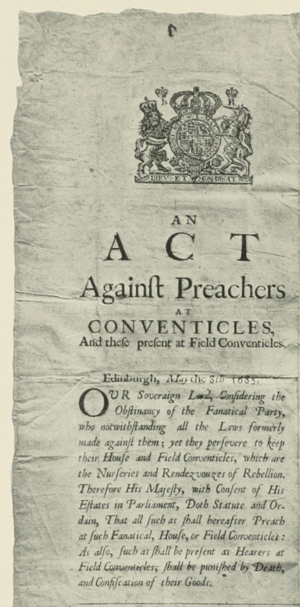Robert Dick (salt-grieve) facts for kids
Quick facts for kids Robert Dick |
|
|---|---|
| Religion | Christianity |
| School | Presbyterianism |
| Religious career | |
| Profession | merchant, salt-grieve |
Robert Dick was a merchant from Prestonpans, Scotland, in the 1600s. He also worked as an inspector for salt works for Lord Carringtoune. He is known for being a Covenanter, a group of Scottish Presbyterians who strongly supported their religious beliefs. They often disagreed with the government's attempts to control how people worshipped.
Contents
Robert Dick: A Covenanter's Story
What Was a Covenanter?
During the 17th century, many people in Scotland were Covenanters. They believed in a specific way of practicing their Christian faith. This often meant holding religious meetings outside of official churches. These outdoor gatherings were called "conventicles."
The government at the time did not like these meetings. They saw them as a challenge to their authority. New laws were made to stop people from attending or leading conventicles. These laws could lead to very harsh punishments.
Why Was Robert Dick Arrested?
On September 4, 1676, Robert Dick was arrested. His crime was attending an open-air religious service. This meeting took place in the Pentland Hills in Scotland. He was arrested along with another man named William Bell.
As they were being taken to prison in Edinburgh, some people tried to rescue them. However, the attempt was not successful. Both Robert Dick and William Bell were taken to prison.
His Trial and Punishment
Robert Dick faced a trial on October 12, 1676. He was brought before the Privy Council, a powerful government group. He was accused of "convocating disorderly and seditious meetings." This meant he was charged with gathering people for illegal religious meetings.
The government believed he helped organize these meetings. They listed many places where conventicles had happened. These included places like Caldermuir, Kirkliston, and Dunbar. Robert Dick admitted he was at the Pentland Hills meeting. However, he refused to give an oath about the other meetings.
Because he would not swear an oath about the other meetings, the Council saw this as an admission of guilt. They decided to punish him severely. He was sent to the Bass Rock, a famous island prison in the Firth of Forth. He was held there for two years in very difficult conditions.
In September 1678, Robert Dick was brought before the Council again. He still refused to give the oath they wanted. For this, he was banished from Scotland. He was sent to work in far-off lands, likely in the West Indies. He probably spent the rest of his life there, forced to labor.
 | John T. Biggers |
 | Thomas Blackshear |
 | Mark Bradford |
 | Beverly Buchanan |


